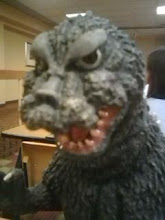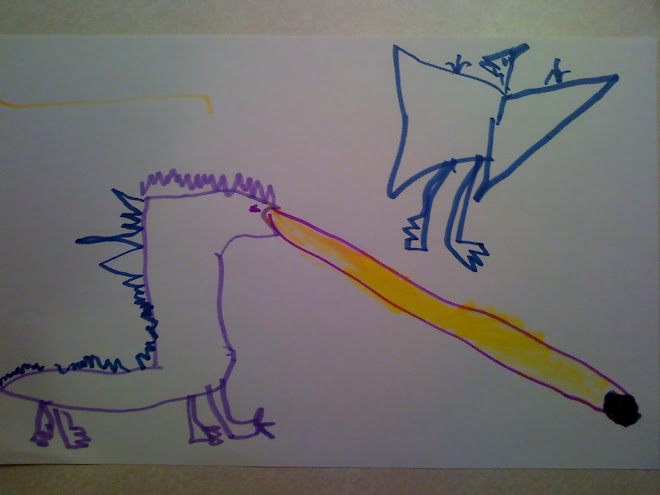 Last week, two (count 'em, two) snow days were all the excuse that we needed to enjoy Ultraman episode 30, "The Phantom Snow Mountain." This entry in the original series features wonderful and arresting visuals--the wintry slopes of the ski resort area are a huge shift from the often urban settings of the series. There is just something cool about Hayata, Ito, and Arashi swerving down the snow-white hillside in their orange jumpsuits and Science Patrol helmets! There are also some awesomely detailed miniatures in this episode, such as tiny skis stuck into a snowbank outside the chalet.
Last week, two (count 'em, two) snow days were all the excuse that we needed to enjoy Ultraman episode 30, "The Phantom Snow Mountain." This entry in the original series features wonderful and arresting visuals--the wintry slopes of the ski resort area are a huge shift from the often urban settings of the series. There is just something cool about Hayata, Ito, and Arashi swerving down the snow-white hillside in their orange jumpsuits and Science Patrol helmets! There are also some awesomely detailed miniatures in this episode, such as tiny skis stuck into a snowbank outside the chalet.I have always enjoyed stories about Bigfoot/Yeti/Sasquatch, making "The Phantom Snow Mountain" a natural favorite. The subtitles propose that Woo, the great white Yeti-like creature at the heart of the story, could be a Yukionna, which I am assuming is a Japanese type of "wildman." Interesting, then, that the "Snow Girl" of the English dub is named Yukinko, which would appear to be a play on words. The tale revolves around the connection that exists between the Snow Girl and Woo. Woo (the Yukionna) watches over the Snow Girl (Yukinko), especially when she runs afoul of the mean-spirited locals. Towards the end of the episode, Ito theorizes that Woo may be a substitute for the girl's mother, who died at an early age. (The Snow Girl's upbringing as an orphan also leads to the revelation that Ito lost his mother at an early age as well.)
What really stands out is the fact that by episode 30, Ultraman was already toying with its own formula. That, I believe, is significant, because here you have the first truly grand-scale Japanese superhero show establishing the formula, but also experimenting and subverting the formula. What I mean is this: Ultraman is often criticized for being "formulaic," but in truth, all television programming follows some sort of formula or ritual. Here, in the mid-late 60's, you had a show for children which was not afraid to take side trips into self-parody and occasional sophistication.
"The Phantom Snow Mountain" subverts the formula in one very striking way: Ultraman does not win his final fight. True, Woo gets pelted with bombs and then half-heartedly wrestles Ultraman in the snow, but in the end, the giant Yeti simply fades into the mist. Ultraman, with no foe to battle, takes to the skies, and that's it. It is a bit jarring, because everyone knows that the formula dictates an Ultraman victory, yet there is none, in a traditional sense. It was an interesting choice on the part of the writers, and one that hits precisely the right note. Woo remains a mystery--a bit of folklore come to life--but in the end he cannot be apprehended. Anyone who has studied wildman folklore from around the world knows that this outcome is absolutely appropriate.
The existence of Woo also allows the members of the Science Patrol--Ito, in particular--to consider the ongoing theme, "Why do we destroy monsters?" In this episode, Arashi seems to have no patience for this line of questioning, but Ito is troubled by the fact that he is tasked with eliminating a being that is simply too large for the world that he inhabits. This is coupled with the fact that Ito seems to sense that Woo is a guardian of the Snow Girl, and actually has a noble quality. Ito seems relieved when he learns that Woo was not captured or killed and that the Snow Girl has evidently disappeared as well. (Although the imagery we are presented with would seem to suggest that Woo disappeared because Yukinko died.) The bottom line is, Ito is not at peace with his core assignment as a Science Patrol member, which is to dispatch with monsters, and that gives his character a depth you might not expect from a "formulaic" kid's show. Ultraman would return to this theme quite often, with unexpectedly poignant results. Subsequent Ultra-series would do the same.
"The Phantom Snow Mountain" is a visual treat with the unique resonance of a folktale. We're left to consider who is the bigger monster: A giant, protective Yeti--or human beings who would chase down a teenage girl with shovels and clubs?


































































No comments:
Post a Comment